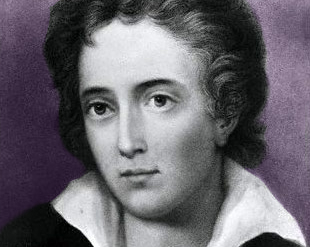
In the letter below, poet Percy Bysshe Shelley writes to his future second wife, Mary Godwin, the daughter of famed philosopher Mary Wollstonecraft. He informs her he has requested money from first wife, Harriet, whom he abandoned while she was pregnant with their child. Godwin’s father, with whom Shelley had been good friends, was furious with this state of affairs. After a month and a half of traveling through Europe, the pair, along with Mary’s sister Claire, had run out of money, and Shelley was being pursued by various lawyers and creditors. He largely blamed Thomas Hookham, a friend and publisher, for his poverty. Hookham took the criticism admirably, and even befriended Shelley’s ex-wife Harriet during their difficult separation.
Shelley was 22, and Godwin 17, when this letter was written.
To Mary Wollstonecraft Godwin
25 October 1814
I have written an extremely urgent letter to Harriet to induce her to send money. I have written also to Hookham, who did not call upon Peacock. I have told Harriet that I shall be at Pancras when her answer arrives. I shall see you to-night, my beloved Mary, fear not. I have confidence in the fortunate issue of our distresses. I am desolate and wretched in your absence; I feel disturbed and wild even to conceive that we should be separated. But this is most necessary, nor must we omit caution even on our unfrequent meetings. Recollect that I am lost if the people can have watched you to me. I wander restlessly about; I cannot read or even write; but this will soon pass. I should not inflict my own Mary with my dejection; she has sufficient cause for disturbance to need consolation from me. Well, we shall meet to-day. I cannot write, but I love you with so unalterable love that the contemplation of me will serve for a letter. If you see Hookham, do not insult him openly; I have still hopes. We must not resign an inch of hope. I will make this remorseless villain loathe his own flesh in good time; he shall be cut down in his season; his pride shall be trampled into atoms; I will wither up his selfish soul by piecemeal.
[Translated from the Greek:] “Hissing forth murder with awful jaws.”
From The Letters of Percy Bysshe Shelley. Edited by Roger Ingpen. New York: Scribner, 1909. p. 431.
FURTHER READING
Last year, the New York Public Library, along with Oxford University’s The Bodleian Library, organized an excellent exhibition about Shelley and his literary coterie. You can still explore some of the collection’s artifacts here. The artifacts include letters, manuscripts, illustrations, and fragments of Shelley’s skull.
Christopher Hitchens reflected on Shelley’s poetry and radicalism here at the Guardian.


